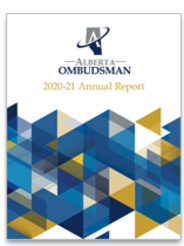The 2020-21 annual report summarizes a productive year, albeit a uniquely challenging one. When COVID-19 significantly affected operations, the Ombudsman’s office adjusted in order to fulfill its mandate of ensuring fairness for Albertans seeking assistance from the public service.
COVID-19 changed priorities for most people across the province, but the degree of impact grew for citizens already relying heavily on governmental programs.
“We heard from families facing job losses, business owners coping with temporary closures, many with health and patient concerns, and from those battling the effects of isolation,” reflected Marianne Ryan. “Even the shift in operations to remote offices did not overshadow the office’s focus on fairness.”
The Ombudsman’s 54th annual report highlighted two significant publications that speak to her office’s work conducting administrative fairness investigations into unfair treatment.
Ensuring individuals with mental health issues were treated fairly lay at the heart of the Ombudsman’s first publication. Released through the International Ombudsman Institute (IOI) as a Best Practice Paper, Giving Voice to Mental Health Patients describes how Ombudsman institutions can design investigations that protect the rights and interests of marginalized groups. Further, it outlines the case for a proactive approach in ensuring those who struggle to have their voices heard have the opportunity to be considered.
The second important publication focuses on the Ombudsman’s Youth in Segregation Own Motion, an intensive investigation initiated when a young person complained about the use of segregation in one of Alberta’s two young offender centres. The Ombudsman’s findings in this report, published also on the Ombudsman’s Website, were congruent with similar investigations conducted by other Ombudsman offices across Canada. Young persons are entitled to confinement standards that reflect basic human rights and meet the requirements necessary for a safe and secure environment. Yet in contrast to most Canadian provinces, the use of segregation in young offender centres in Alberta currently lacks any legislative basis.
Beyond the office’s typical fiscal year-end reporting and statistical results, readers will find more about the Office of the Alberta Ombudsman and how it conducts its work within the sectors it most commonly hears from. The office touches on our intention to pursue modernization of the Ombudsman Act and describe referral, early resolution, and full investigation cases from 2020-21.
Source: Office of the Alberta Ombudsman, Canada

